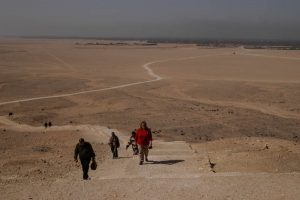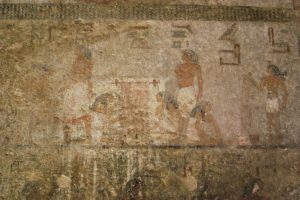Driving to Minya today to see Beni Hassan, which requires a security person in the car and a police escort the rest of the way. Minya is in Middle Egypt, and is considered a serious Muslim Fundamentalist stronghold.
The Desert Road
It’s four hours on the desert road to Minya. Everyone still gets a little nervous about the presence of tourists, and our guard in the car, Mohammed, (hereafter referred to as “front-seat Mohammed”) explains that it is because snipers have been known to sit on the banks and fire on the cruise ships. When I point out that we are not on a cruise ship but in a small van, he shrugs and smiles, tucking his MAC 10 on the floor of the van between his feet. He is a nice guy, who speaks reasonably good English (and wants to practice). It must be boring going back and forth to Minya every few days.
 There are dozens of checkpoints along the highway, and a few crashed cars and trucks are all the scenery we can watch. Some of the accidents look very serious — a big truck and a van collided, with not much left of the van. Another truck off the road. George says that 7000 people die in traffic accidents each year in Cairo and the nearby desert roads. Mr. Mohammed added that it was more dangerous on the desert roads, since people drive at night with no lights “to save the batteries”.
There are dozens of checkpoints along the highway, and a few crashed cars and trucks are all the scenery we can watch. Some of the accidents look very serious — a big truck and a van collided, with not much left of the van. Another truck off the road. George says that 7000 people die in traffic accidents each year in Cairo and the nearby desert roads. Mr. Mohammed added that it was more dangerous on the desert roads, since people drive at night with no lights “to save the batteries”.
At one point we are escorted by an enormous armored car. Oh, no..don’t draw attention to the American tourists! Usually we just had to stop and wait while they checked us out and cleared us for the next checkpoint. A few times we had a car escort us for a awhile, or a local police officer in the van with us. We picked up another tourist policeman, also named Mohammed — we started calling him Back-Seat Mohammed. We now have Driver-Mohammed, Front-seat Mohammed, and Back-Seat Mohammed as well as Mr. Fateh. But wait, it gets better.
It was about this time that we realized that most of the tourist police at the checkpoints were referring to us as “two crazy americans.” An officer would step up to the van, little notepad in hand, and peer inside, asking who we were. Mr. Mohammed would explain that we were Americans and where we were going (all of which was written down in the little book). Then, the officer would step aside to confer with his fellow soldiiers…who would then point and laugh uproariously. “Tneen [crazy] Amriki.”
Look! There’s an American!
We checked in at the Etap Mercure, the nicest hotel in the city of Minya, before heading out. The room is pretty basic, and there are armed guards wandering the walled compound. We might have been the only ones at the hotel, and it was clear we were the only foreigners. Everyone was exceedingly nice and very efficient–Within 10 minutes of checking in, a nice you man had brought a bottle of water. A few minutes later, another young man brought a fresh fruit basket. A bit later, yet another young man came to tell us that lunch would be served in the restaurant when we were ready. It made us feel a bit like we were on display — everyone at the hotel had to come see the crazy Americans!
Lunch — beef filets and mushrooms –was very tasty, and served by the manager of the restaurant. Then we headed out to see the tombs of Beni Hassan. It’s a long drive through a number of very small villages to get there, winding through the narrow dirt roads between the flat facades of the mud brick houses with bright doors. All along the main street of one village, people have planted trees in large pots and surrounded them with circles of concrete block — i assume to keep the animals from eating them.
It’s Friday, so prayers are being broadcast on a loudspeaker and the streets are deserted except for a few stray goats and a couple of young children. It’s the one place we have been that the voices didn’t sound friendly, and we begin to wonder if the security is warranted.
We picked up a few more guards along the way. Beni Hassan is on the Eastern shore — odd for burials, which are nearly always on the west. But, there aren’t any cliffs on the western side of the Nile, so the tombs are in the 90′ escarpment overlooking the river on the east. It’s a long haul up the hill. Everyone, including the tourist police, stopped on the first landing where there were benches and rested a bit. I mean, I’m out of shape, I know that, but it was pretty much a vertical climb.
These are interesting tombs, if a bit plain. Most are just simple rooms with a few pairs of pillars, decorated with crudely painted scenes that seem to feature wresting more than anything else. But the view over the floodplain from the ridge is inspiring. At least two of the tombs Two of the tombs have huge collections of stick-figure-men demonstrating wrestling moves. Compared to some of the exquisite art in the tombs in Luxor, these seem rough and childish. We visited the mostly-ruined tombs of Amenemhet, Baqet III, Kheti, and Khnumhotep. These men were important administrative officials, which explains why they have such relatively elaborate tombs.
On the way down, a school group was climbing the stairs, with many greetings of “Hello! Hello! Glad to see you!” and much handshaking. Most kids speak English and will practice on us whenever we meet them. They seem fascinated by Mark, who is the tallest person I’ve seen in Egypt, and topped with red hair, to boot.
“Hello! My name is…” they said, shaking our hands gravely. Then, “And you-re naming is…” Much better than our Arabic, which is limited to hello, goodbye, yes, no, thank you, and counting. Sort of. “Isme Mark,” my husband would respond, just as seriously, after being told by Front-Seat Mohammed how to say “my name is…” We bought everyone sodas and water the rest house at the bottom of the hill.
When we returned to the hotel, we were told very explicitly that we were not to leave the hotel grounds. A small contingent of security police and regular army remained in the small courtyard. A pity, really — Minya seems to have a delightful park along the Nile, and there was a fabulous wedding party just outside the hotel that we could just see through our window.
